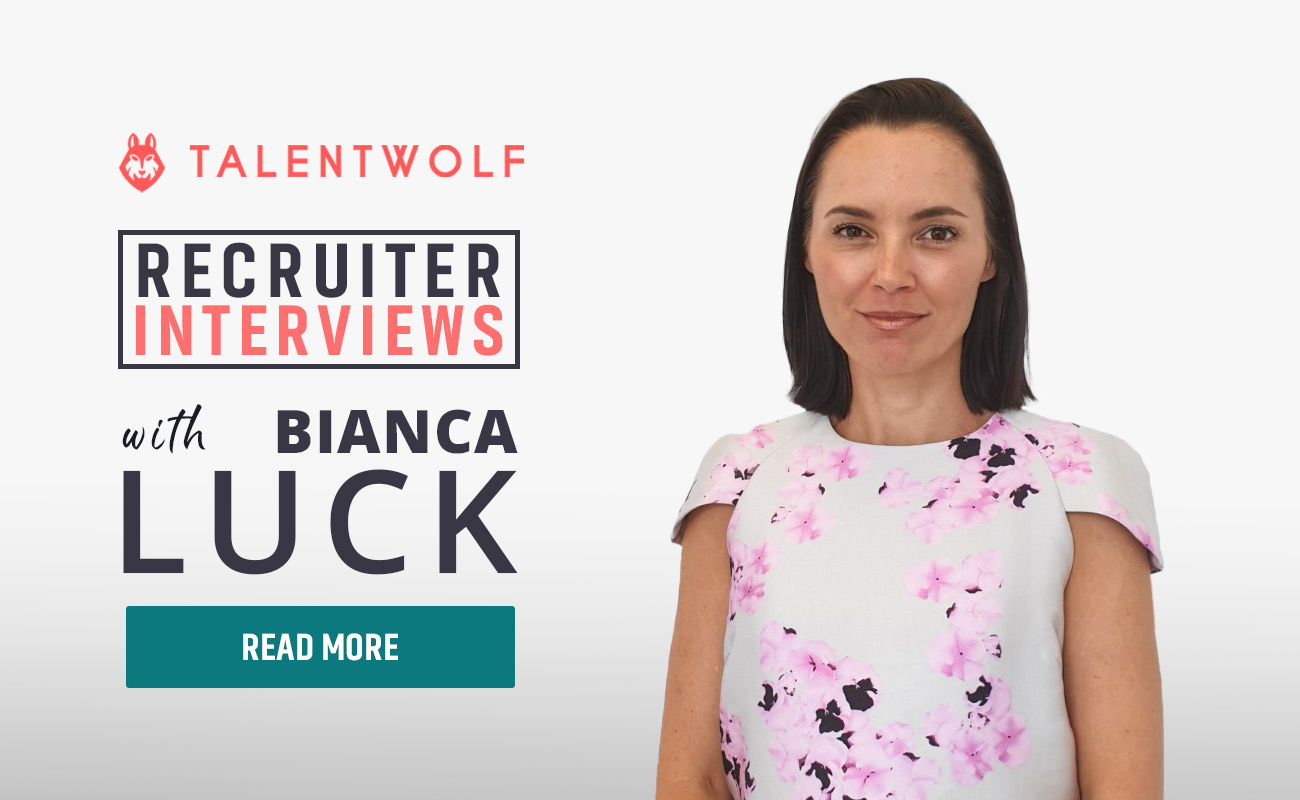Welcome to another week of Talentwolf recruiter series!
Some people have
described her as a pocket rocket, Energizer Bunny, others simply call her Bee. Today we are joined by
industry veteran Bianca Luck. Of course, she’s a testament to the fact that luck
has nothing to do with it and you create your own. Happy reading and make sure
to connect with this industry gem below!
As always, we start with
how you chose or fell into the recruitment industry. Bianca, what’s your
story?
I
graduated from ANU with a Bachelor of Arts and a double major in Psychology and
like many other recruiters my career goal was initially to be a Human Resources
(HR) professional. Ultimately, I thought I wanted to help resolve issues in the
workplace, recruit, engage with employees and improve individual team
performance. I was somewhat right.
My
first job straight out of university was part-time selling Furniture at Freedom.
I stressed to my manager at the time, that it was only ever going to be a temporary
gig as I was beelined for a career in HR. Every day she offered me a permanent position
and after a lot of negotiation I accepted but only on one condition; - if I reached
my sales targets I would be rewarded with the opportunity to work one day the
following week in the HR department. With this motivation, I smashed my target (most
weeks).
I’d
trawled the Sydney Morning Herald career pages most Saturdays and after about
12 months I applied to a Recruitment Solutions Graduate advertisement, thinking
it was an HR role. I was told that my resume stood out because of my little HR
experience and was offered the job. I started in January 1997 and in 2002
Chandler Macleod acquired Recruitment Solutions. I quickly fell in love with
recruitment and expelled the pipedream of working in HR.
I spent 13 years working for Chandler Macleod when Mark Smith perfectly executed a lengthy seduction and headhunted me to work for his relatively new agency called people2people. At the time people2people was only 5 years old and was small, located in one office employing only 20 people. Now 10 years later, we have 8 offices in Australia and NZ and employ 110 staff. Currently, I manage the temporary accounting team and I’m a Director for NSW.
As a stalwart of the
industry, going for over 20 years and still growing from strength to strength,
some (including yourself) will say that you haven’t even hit your peak. What
keeps you going?
·
The thrill and buzz of filling a job – its
like a shot of adrenaline every time. I just love making a sale!
·
Building meaningful relationships – Some candidates I’ve placed in junior accounts roles
back in the early days of my career are now CFO’s who rely on me exclusively
for their temps. I built trust with them early on, followed their careers,
formed friendships and developed loyalty.
·
My people2people family – They rock, and I
couldn’t ask for a better team. Some I’ve worked with for my whole career –
more than 2 decades.
·
Being optimistic, energetic and always having
fun in the office. Life is too short to
be serious.
· Way too many gym sessions: I’m an absolute sucker for being healthy and keeping fit.
What mistake have you
made that made you become a better recruiter?
When I joined people2people, initially, I was employed as a permanent consultant. At the time I was working part-time and planning on having a second baby and I thought I could manage the permanent recruitment process far better than temp as I was juggling so much at home.
The lengthy process of permanent recruitment frustrated me and if I’m
honest, I wasn’t good at it at all and didn’t enjoy it. After 1 year, I
switched back to the wonderful world of temp and quickly got my mojo back.
Being a million-dollar biller is a coveted title and achievement in
recruitment, we’ve seen you hit these heights for many years now. What’s your
advice for your fellow recruiters out there, to step up and bill at this level
each year?
·
Be social – Build a personal brand and community online. Post every day, don’t hide
behind a company brand, be authentic, engage with your connections and show your personality online. Choose your
platform; mine is LinkedIn.
·
Market – Build solid relationships with influencers and decision-makers; i.e. line managers and internal recruitment / human resources team/s. Devise a long-term marketing plan and follow careers rather than chasing one-off placements/sales. Never be complacent with the recruitment lifecycle and treat everyone
as equal regardless if they are candidates or clients. Always keep in mind that candidates become clients and clients become candidates. Meet your clients face to face
and ‘feel’ the company culture by walking around their office. Job matching is so much easier when you know what you are sourcing for.
·
Respect - Treat everyone with respect. Ultimately looking for a job can stressful. Candidates may not remember if you found them
a job, but they will always remember how you made then feel during the process.
·
Communicate - First preference should always be the phone, don’t hide behind
email. Very hard to build solid foundations/relationships over email. Always call the client and brief them on the reasons why you are shortlisting
each candidate. Never miss an opportunity to sell and market your services. Always gear candidates before client interviews.
·
Control - Information is key. Control the recruitment process and understand what the candidate and client competition are at any one time.
·
Speed - Time kills all deals, especially in temp
recruitment. Work fast, without jeopardising service and quality.
·
Loyalty - Stay loyal to the company you are working for. Longevity and tenure can make a world of difference.
·
Trust - Don’t break trust and let people down. Keep conversations confidential and do what you say you are going to do.
·
Listen - Recruiters are notorious for talking too much. If you listen, you can tailor your sales pitch depending on what answers are given.
·
Exclusivity – Ask for it. If they agree, you’re in the money!
What do you foresee being
the greatest challenge and opportunity for recruiters over the coming 5
years?
The
greatest challenge and opportunity for recruiters over the next 5 years is
without a doubt the war for talent and managing candidate shortages.
Challenges:
·
Investing in sophisticated technology and
proactively building talent pools and databases should top of mind for
recruitment companies. At people2people we’ve done exactly this and interestingly,
85% of the placements we made companywide in 2019 were from candidates that
were already on our database before the job was registered.
·
Recruiters should embrace a long-term
candidate sourcing strategy seducing and targeting passive candidates that are already
employed. Traditional sourcing techniques (i.e. job boards) just aren’t as
effective as they used to be. 70% of the global workforce is made up of passive
talent and 90% of these are open to hearing about new opportunities. Candidates
have a lot of choices these days and effort/selling from the client to standout is
also required.
·
Counteroffers will continue to rise which
will put pressure on salaries and hourly rates and will find clients ‘bidding’
for talent and stiff negotiating and control skills will be required by
consultants. Company benefits and attraction strategies will also be required
to entice future hires and retain existing staff.
·
We will continue to see low levels of
unemployment and as the ageing population retires. The numbers of younger
workers are substantially lower creating a skills gap and putting more pressure
on the war for talent.
Opportunities:
·
Recruiters/owners should implement
strategies to improve the candidates/customer experience. Through human
contact or by bots and Ai technology. Building a solid bond by treating them
well feeds commitment, contract tenure and placements.
·
Companies will have no choice other than to
be builders of talent by recruiting and investing in their people by training
and upskilling hard skills. Soft skills, those with a curious mind and an
aptitude for learning will be advantageous.
·
Automation and technology advancements –
Human skills are not on the way out, just evolving. New jobs are emerging that
didn’t exist before, creating opportunities and skills shortages.
· There will be an increase in temp, contract and freelance recruitment
to bridge the skills gap. A flexible workforce gives companies an opportunity
to stay nimble and reduce fixed costs. Temporary
employment in the US will grow faster than all jobs through to 2025, increasing
by 8.5% compared to estimated 6% growth for all US jobs (according to job
forecast from TrueBlue and Emsi). In 2020 40%, 2025 50% and 2027 most people
will freelance in the US. Recruiters will need speed, and a solid network/database
and negotiation skills to fill these roles.
What changes have you
seen in recruitment from your first 5 years until now?
So
many changes. We didn’t even have email when I started in recruitment. We only
had a phone and a referdex of numbers. Our system (if you could call it that)
was DOS-based and we used paper files and whiteboards. 99% of jobs were filled
over the phone. The recruitment process was less structured and very rarely did
the client request to interview a candidate.
There were no google maps to get to
client visits on time and we had approximately 10 candidates ‘walk-in’
registrations per day. The office was noisy, like a trading floor and there was
little or no job flexibility regarding hours.
Now the competition is greater, there are many more steps in the recruitment process, we have access to 10 million resumes and with technology advancements flexibility has increased.

What industry changes did
you initially reject but embrace over time?
I initially I thought any correspondence via email including sending resumes was a waste of time
when it was much easier to get on the phone /sell and have a conversation, fill the job and make the money! Sadly, now email is a necessary evil that we cannot live without.
As the queen of Talentwolf so far, we’ve seen success in a short space of time from your increased online engagement and personal brand with social media. What prompted you to start and how has this changed you?
Last year, I was very fortunate to have the opportunity to work with a personal branding expert from Brand me Better - David Wolstenholme. He helped me redefine and develop my personal brand/values and gave me the confidence and tools to put myself ‘out there’ on social. From here I started to build a social community on LinkedIn. I now post updates every day and had an enormous amount of success from doing it.
What was your greatest placement?
So many great placements, hard to pick just one. I get a huge amount of
pleasure building teams and developing relationships into exclusive partnerships, where a client
wouldn’t dream of engaging another agent and when he or she wholly and solely trust
me to go and hunt and gather and recruit for them.
Repeat business
makes me happy and fuels my belly to work ten times harder and faster to fill a role. Exclusive roles like these are prioritised so the great customer experience is maintained.
One of first clients back in 1997 was a large shipping company where I recruited over 250 temps for them. I’ve nurtured this relationship for 23 years and still have temps
with this business and still recruit for their ex-CFO and ex-HR
Manager who are now working for different businesses.
I also have been responsible for building teams as a result of a major
restructure for a large FMGC business, where I recruited approximately 30 people for the company.
I recruit exclusively for an IT business and have placed 60 people with them in 7 years since I have been on the account. Before I worked on this account, they used a handful of other recruiters and had a lot of turnover. I’m very happy to say that today they don’t have either.
What’s left for you to achieve going forward?
I’ve been a billing manager for a short time and the next thing for me
to achieve is to part some of my recruitment knowledge onto my team and build a highly successful, happy billing team around me.
How do you handle time off and holidays? Do you put your phone away and
switch off?
I do my best at trying but the reality is I like to know what is happening,
so I read emails, will respond to urgent ones - especially if the response is going to assist one of my candidates to get to the next level of the recruitment process. The only time I
totally unplug and switch off is over Christmas when everyone else is off. This is when I will ‘flick pass’ anything to my colleagues who are working to sort out.
How does fitness help you achieve more year on year?
I aim to go to the gym every morning unless I physically can’t make it
because of a commitment, or if my body is telling me
to sleep in. It keeps me focused, gives me
clarity and makes me a much nicer, happier, calm person.
What are your ‘recruitment words’ that make no sense to anyone outside the industry?
I do tend to shorten words and talk fast (maybe because I am a temp recruiter). Some of the words I like to use are:
Res Resume
p2p people2people prepared resume
Will do A candidate who is willing to do a job we are recruiting
Covered Candidate who has authorised a consultant to represent them to a certain job and company
Backpocket Candidate who will be included in the second shortlist, if the first shortlist doesn’t ‘cut it’.
Bombage Excellent candidate that will blow a client’s mind
Bombout people2people placement that has resigned or received unfavourable client feedback
The Biz AKA ‘the business’ which means, the best. A+
candidates are often referred to as ‘the biz’
Hitlist A+ candidate
FOJ’ed Found Own Job
Dead An inactive candidate who is no longer searching for a role
Sort it out GET IT DONE!
Connect with Bianca Luck





